THE WAR IS NOT A METAPHOR: The Capitalist, the Defector, the Traitor, and the Revolutionary
Disclaimer: This was my first live essay, meaning that I taught it with a diagram I drew out for a live audience. If you are one that typically reads or listen to the essays, I would actually recommend giving this one a watch! While screenshots are included throughout the text, I believe it’s also helpful to watch the board fill as we move through these ideas.
Thesis upfront:
I believe art making constructs worlds, both in the ways art shapes our minds and in the tokens of power art affords us as artists. I am, thus, dedicating book sales to building public infrastructure, starting with a library in Freetown, Sierra Leone. You can support this initiative in the following ways!
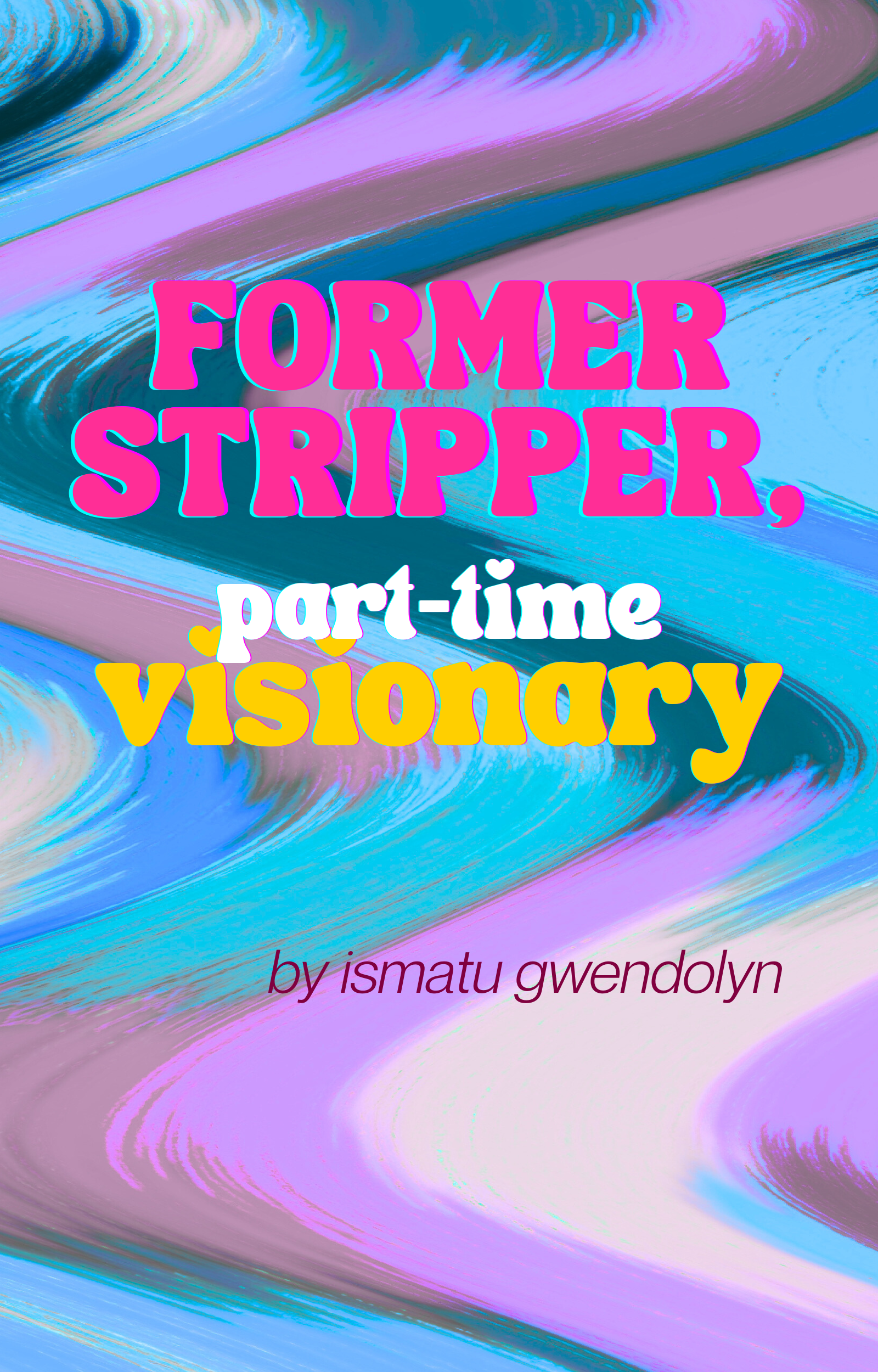
Buy it here for faster + international shipping
Buy it here if you live in the United States and hate Amazon
Get your hands on Former Stripper, Part-Time Visionary, a collection of essays that sees the author (me!) go from burnt out grad-school sex worker to radical therapist internet star. 100% of the proceeds are for this library! Only on sale until May 28th– I know, I know, where has all the promotion been? I was working on the rice harvest, okay? Idk! I’m telling you now! Get it while it’s here!!!
If you’re like, ismatu the book is free to read online, I just wanna donate– word. You can slide a dollar here.
https://gogetfunding.com/phase-one-library-infrastructure/
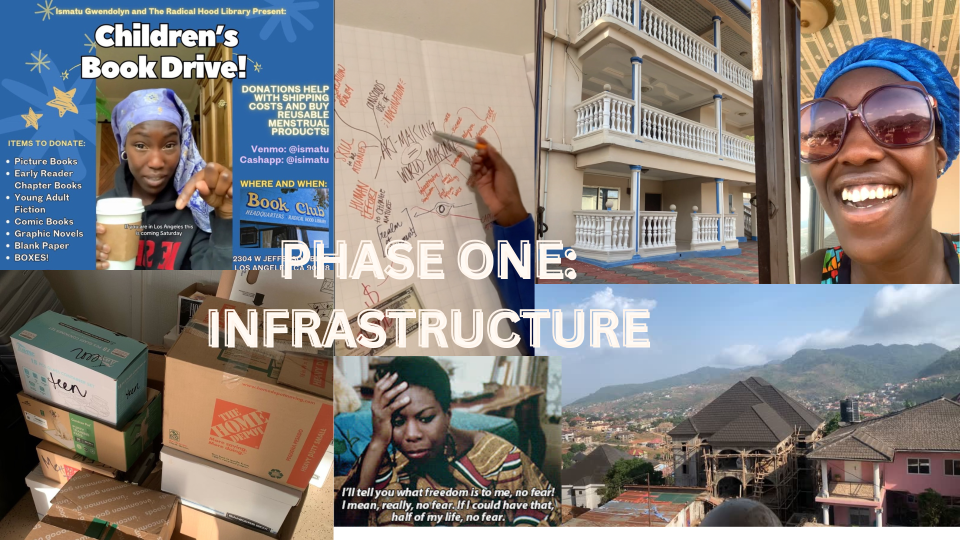
Why is this happening?
Revolution is a science! You develop your hypotheses and act upon them!! I can’t just sit here and pontificate about what art has the capacity to do, I have to test out and act on these theologies. I want to figure out what works so I can expand on and replicate those systems, not just for the sake of being right, but for the reality of material gain for my peoples.
Word. Alright. Let’s get ready to rumble.
introductions
My name is ismatu; I am 26 years old. I live in Freetown, Sierra Leone but I come to you (at the time of recording) from New York, New York. I wanted to see my family, and I genuinely grow more and more fearful of the day that I, a United States Citizen, cannot come to this country to see my family anymore. So I came back before I can’t anymore. I am here engaging in a work of public and collective thought for the following reasons:
(1) to archive this moment in my personal and our collective history
(2) to work through, intellectually and functionally, the compulsions our attention creates.
Cultural Context:
Earlier this week, I helped a friend of mine pick up a cat from her friend’s apartment in Chicago. As I said, I am in the US to see family; my mom had her final surgery of her cancer operations (and she asked me to tell you all she’s doing very well). I am standing in this apartment with the homie wondering why… everything feels… eerie. This sweet little cat is busy crying for human touch. The neighbor of the man who left was there when we got to the apartment, tending to the kitty. She began talking to my friend about the situation, making a plan for the caring of the animal. No one said anything explicitly, but then: no one really needed to. The absence of a person facing abduction is obvious: food still in the fridge, medicine and books and half-completed errand lists, laundry needing to be done and a cat’s water bowl needs refilling. Someone who was in the middle of their day, in the middle of their life, fled in the night because the United States administration hunts and jails academics who dare to reference a different world. A new class of political prisoners and exiles metastasizes. Literally and without exaggeration, people are getting abducted off the street.
When I talk about art-making as integral, necessary, crucial to the building of a new world, I get consistent pushback that the role of the artist is overstated. I could not agree with the sentiment less-- I already wrote an essay about art-making as world-making, so I refrain from rehashing what’s already been said. I will only add: if the empire agreed with you that art-making means nothing, they would not slather the waking world in art disguised as advertisement (meaningless unless our brains need to be trained constantly towards the goals of capital). If the empire agreed with you that the results of art-making are overstated, non-impactful or ineffective, they would not hunt and capture the academics. They would not make the scientists paranoid social pariahs. They would not target and slaughter the journalists. “Meaningless” unless someone uses the art of world-making to create, bolster, or imagine realities alternative to the one we are force fed.
I. HOW DO YOU MAKE A WORLD?
I argue firstly that art-making and world-making are the same things, and that both acts create new sets of truths. Art has a few definitions:
- The conscious use of the imagination in the production of objects intended to be contemplated or appreciated as beautiful, as in the arrangement of forms, sounds, or words
- Skill that is attained by study, practice, or observation.
- Human effort to imitate, supplement, alter, or counteract the work of nature.
- A re-creation of reality according to the artist's metaphysical value judgments.
Okay. Art-making (the making of new realities) can galvanize people, can move people to action. When you present new truths, new forms of beauty-- if you understand art-making as world-making, you understand that you can create art in a way that compels the masses towards new senses of truth, new senses of movement that were otherwise not there. People cannot move towards what they cannot see, so command over what is imaginable is literally command over the earth as it stands.
Your attention, where you cast your eyes, is deeply, deeply, profoundly lucrative. Your attention is very lucrative. So wherever you cast your eyes, right? Like by the time that you grow up into a level of consciousness where you understand yourself as a part of the world around you, eight, nine, ten years old, you are a part propaganda. You are a cyborg. You have the technologies of the empire embedded into your very brain and person. The command over what you can see dictates what you think is real, good, bad, achievable, reasonable, personal, dangerous, lovable. I call this-- where you set your eyes consistently or where your eyes are fixed upon if you personally set them or not-- I call this the realm of attainment. A maxim I say often: your attention is deeply lucrative, but there’s more than that: beyond capable of producing capital, beyond being lucrative, your internal and external gaze or sense is capable of production. Not just the production of cpaital. The production of anything.
Where you set your eyes is also where you set your ability to attain what it is that you think of or look at or want desperately. This is what you conceive of as possible and we don't do anything that we fundamentally consider is impossible.
Capitalism requires complete domination over the world we inhabit to continue. It cannot and will not share reality. So what it does is it takes our attention. It hijacks our eyesight such that we only ever look at the realm of attainment through US Dollar bills.So, from the time that we are born, we are taught to cast our eyes towards the spoils of capitalism. From the moment we can begin to want things, we are taught to associate our desires with the current iteration of money. You want fruit? No, you want money to buy fruit. You want your parents? You want the love and affection of your family? No, you want your family to make more money so that your parents can buy their time back and give some to you. These things that used to be free, the spoils of the earth that used to come to us in mercy that did not require toiling now require an intermediary because this system of belief keeps capitalism powerful. The pinnacle of life is a life that has become comfortable under the social order and economic system that currently exists. We are trained to associate sovereignty and freedom with US Dollar Bills.
There are two really big issues with that:
(1) neither paper money nor numbers on a screen have any intrinsic value. It’s valuable because we believe it is, and because we believe that capitalism and it’s empires will continue to have complete control over the world. When our certainty of the economic stability of capitalism shifts, the value of this money fluctuates wildly (which is what’s happening now. As of April 12, 2025, we’re witnessing wild fluctuations in the stock market spurred by economic warfare). But to my point: you cannot eat this. You cannot drink it, it will not grow anything, it cannot power your home, it will not keep you warm at night it will not protect your children from bombs it is literally just a piece of paper. There is no intrinsic value. Our current monies only have the power of belief. We will come back to this.
(2) The current economic system requires slaughter and slavery. Spoils cost blood, okay? Meaning this money that we made up requires the consistent death of people within the colonized world via complete extermination as what happens to indigenous people when we want to create property out of sovereign land or the constant death of enslavement for resource processing and manufacturing or usually a dastardly combination of the two.
We will come back to this idea. These two things about why capitalism is fundamentally not working for the majority of the world, we're gonna come back to this. So, on this other side, what kinds of world making are there?
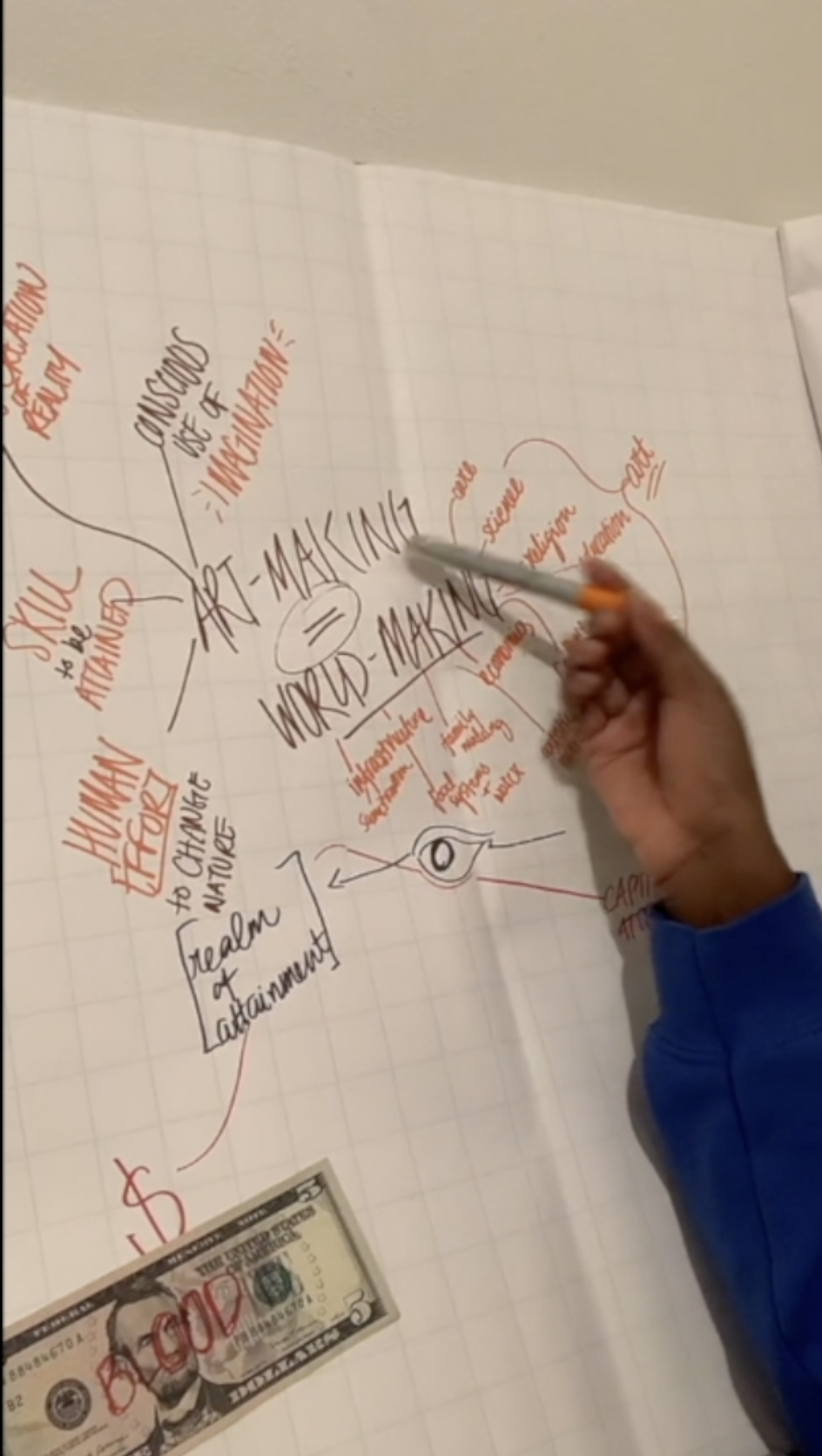
To be able to shape truth in a way that is palatable for the people around you, where it makes sense, where they can share it with others, to have a new way of seeing the world that you have created does not just create a world of possibility. You have created, in making a new thing, in pulling a new thing down from the ether, a new way to relate to oneself, to relate to the people around you– you have 100,000 eyes, a set of eyes, a hundred eyes, 10 different pairs of eyes on a new thing. The person that witnessed something drop from the ether and develop into our material world– they are now capable of wondering what else is possible. To be human is to search for something. Every person making art– any kind of art!– pulls a new reality into existence from an infinite set of possibilities. And every person witnessing that art now has the opportunity to ask, what else? And makesomething for themselves, for ourselves, new things! Which means that for every set of eyes, a new set of encapsulated infinity is possible. You make worlds when you have new kinds of ways to tell the truth; new things become possible.
Alright. So then: it is not an accident that the only kinds of art that denotes a sense of freedom we get from our hyper-visible Black world-makers is one that tells us the only freedom worth finding is in US Dollar Bills. I have previously decried the value of representation politics (what does it matter that the person hyper-visible looks like you if they do not want to help you)? However– I now believe this mode of thinking was a fundamental reduction of how powerful it is to be visible. Now that I have gained more visibility and will continue to do so, I need to ask myself how I can use the power of making new realities to destabilize what causes death and draw towards what causes life.
II. POWER IN VISIBILTY
I want to take us back here, to the realm of attainment.
This essay was titled, “I was DEAD WRONG about representation politics” for a long time, because I felt inspired to write it from studying two public figures I admire: Bethann Hardison and Muhammad Ali.
I began working on it in February of 2024, when I watched the documentary Invisible Beauty, starring and co-directed by Bethann Hardison. Her activism materialized in a professional sense after she ended her career on the runway and opened a talent agency. She says during her moments of reflection over such a lovely and storied career, that if she could change the way people perceived things, she could change the world.
Art making is world making. Art making is world making, the two are the exact same thing. And what we make in terms of art affects what we conceive of as true, good, possible, desirable, et cetera. It changes our realm of attainment. It changes literally what we believe we can achieve within our lifetimes.
Bethann Hardison is one of the primary reasons people look at me and go, oh, you should be a model. Bethann Hardison is 82 years old. She remembers when the Negro was not in Vogue (that’s word to Langston Hughes).
She remembers when there were no dark-skinned, unambiguously Black models on the runway– and I cannot express enough how much fine art shapes the mainstream. Art helps us understand what is good, desirable, achievable, POSSIBLE, okay? The woman was engaging in the infrastructure of thought. She was a thought architect– not just in killing it as a model in the Battle of Versailles, but as a casting director making sure that the Black model, or the non-white model as a whole, did not end with her.
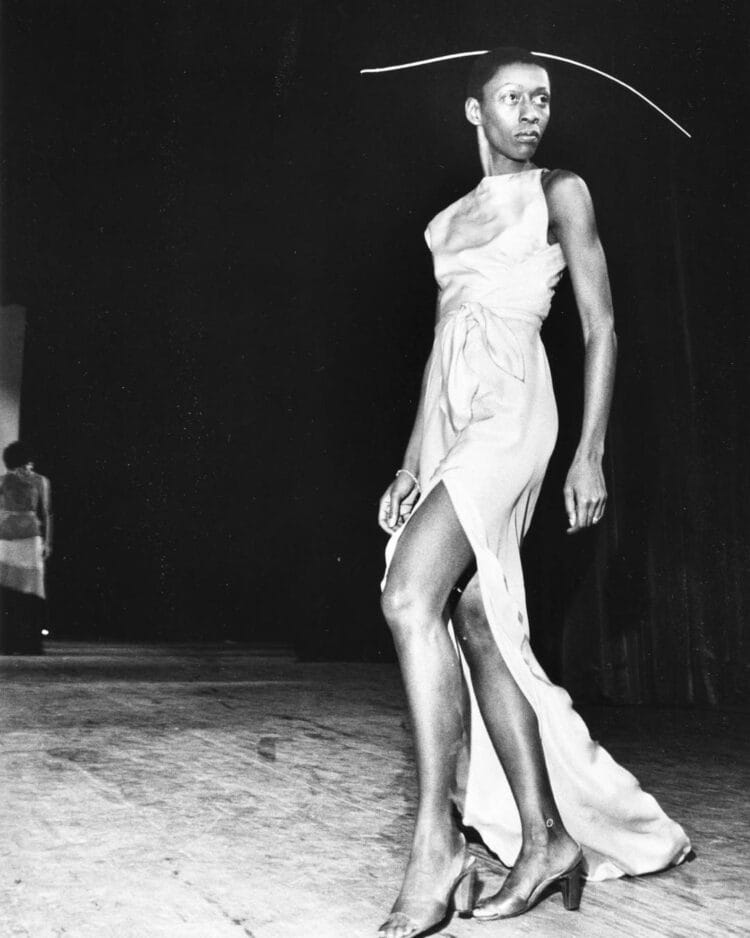
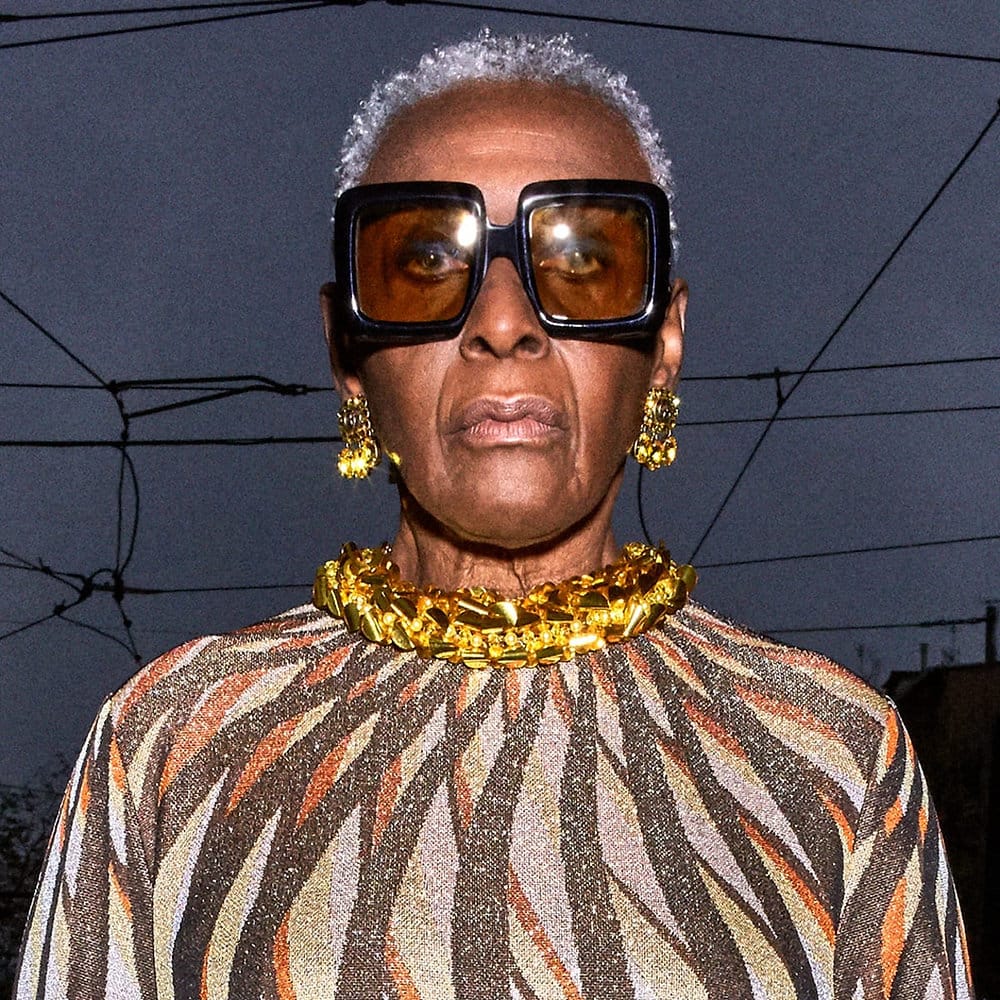
If you have not seen Invisible Beauty, I cannot recommend it enough. I’ve now watched this movie several times. I’ve showed it to my mom and we watched it more than once. For one: it’s not easy these days to have intergenerational heroes. I am grateful to Bethann Hardison for taking the time to document herself and how her desires for a life worth living changed over time. The film was also a really humbling experience and bolstered my politic. I need to have an understanding that I exist within a global spectrum of struggle, a global spectrum of fighting off oppression in whatever ways we have access to. So where I'm very hoity-toity, me and my new age thought (baby radicals always think that we're the first people to ever do it), I'm sitting here like, well, who cares if we have black supermodels when systems of Beauty are still violent? And while that's a good point, I realized in watching this film that I forgot I have literally never lived in a world where Blackness was not the shit. I have never wondered about what the world would or could be like if unambiguous blackness was seen as beautiful without question, was seen as marketable, was seen as the leading lady, was seen as the rich girl on the sitcom. Like I've never ever in my life thought I wasn't pretty, ever. I have always understood myself to be the prettiest girl in the world, second only and exclusively to my mom, okay?
In my questioning, what else is possible? I failed to consider what ignited those new realms of possibility within me in the first place. I owe Bethann Hardison so much gratitude for shaping my school of thought by ensuring that she made The Bluest Eye by Toni Morrison read like a true work of fiction for me. I have never, I have never been able to relate. And what a good thing that is, quite frankly.
I also want to cite the four part documentary series titled Muhammad Ali by Ken Burns, which runs on PBS (which the Trump administration is attempting to gut funding for!!)– a truly remarkable and balanced weaving of public archival to memorialize the late and great Muhammad Ali. Again, I feel the limitations of my youth stretched while watching these films. Each of the four parts is a full-length documentary in and of itself, by the way.
I did not know how much Ali stood to lose by defecting from the Vietnam War. Here's the not so great part about living in the after: the end feels inevitable. But when Vietnam was happening and it was causing mass disillusionment within the American peoples at what a colonial war actually looks like and costs, not dissimilar to what's going on with the genocidal war in Palestine happening right now, we didn't actually know how that story ended. There was a fissure, a fraying of faith within the American project from the American populace for the first time in most people's living memory. And so then you have the most prolific (and I mean that, the man was a poet), the most profiled, one of the most documented, one of the most famous men alive, the heavyweight champion who is getting drafted for the war saying, no, I will not go to Vietnam. I will not go kill those people over there. It is for one, against hiw religion, and for two, as many people were saying, Viet[namese] never called me n*****.
I didn't know how much he stood to lose by defecting from the Vietnam War. He put his entire career on the line as a black man in the 1960s, and not just his ability to perform as a professional fighter, but the ability to peacefully go outside. All of the adoration that he was getting converted immediately into vitriol. How dare you use your art-making (in this case, the practice of religion) to pull down an unwelcome reality? Don’t you know you’re supposed to relish the opportunity to promote death? The death machine is what it’s all about!
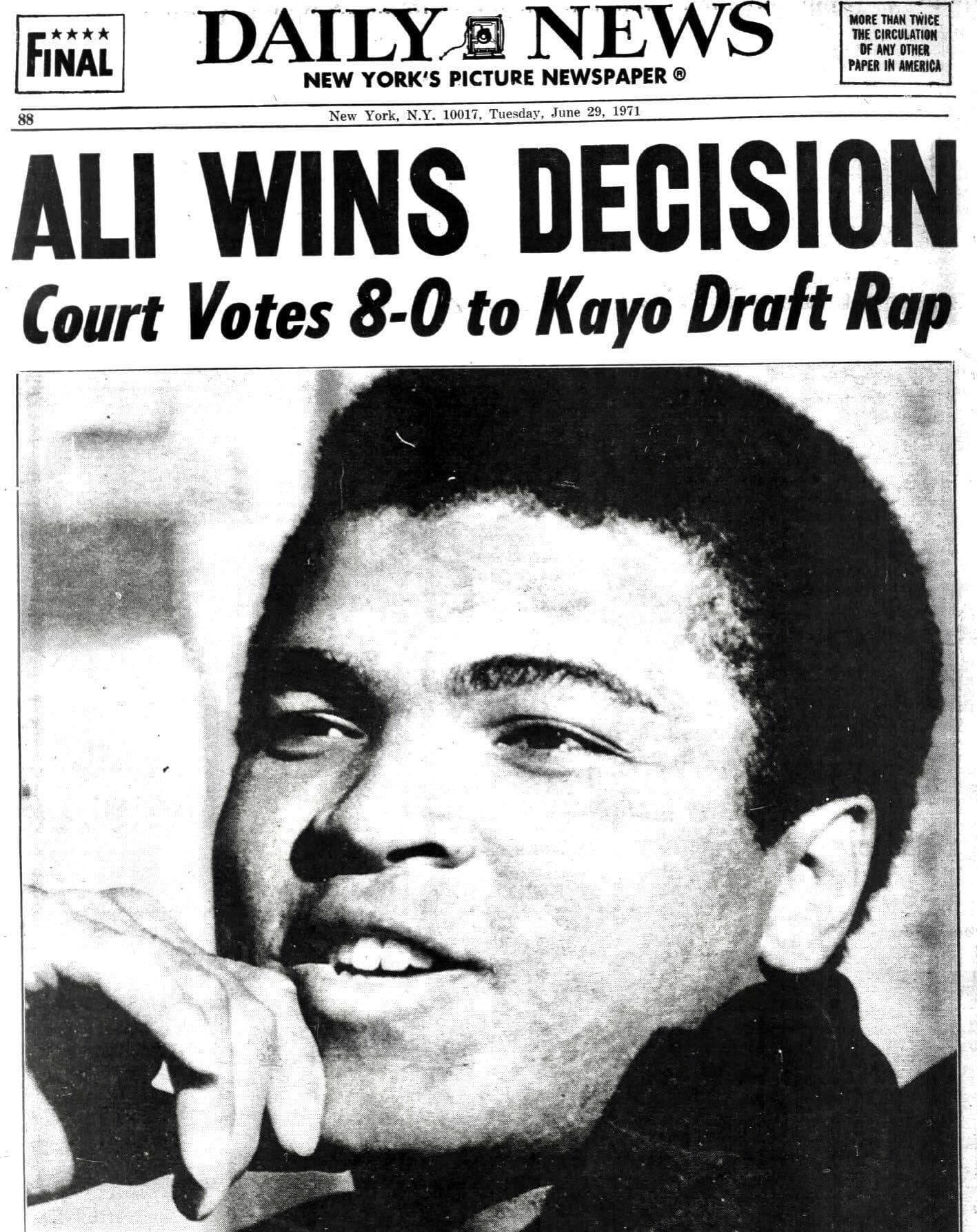
Such a quick citation simplifies the heights and depths of this political, economic, and social decision, but I only want to say: Ali was a man that understood the power of visibility. He, a world-famous public figure at the time of the draft for the war of attrition prepared himself to face imprisonment for defecting from the war. He knew he was not going to Vietnam with a gun in his hand, but to use the power of his celebrity as a tool of propaganda for the US empire. And he still said he would rather go to prison. He still stood up on that. He went to court on that. He was blacklisted in his career on that— all of it.
The point of this section, okay, here’s the thesis: visibility shapes possibility. Visibility shapes possibility. And truly, anything is possible for humanity. The hardest part is getting us to believe that it is possible, whatever it is. Here’s the hard sell at the moment, right: we, the masses, believe at the moment that freedom comes from US Dollar Bills. We, the masses, the colonized Black masses in particular, only have representatives that tell us that the truest freedom that can be found is in these silly paper notes that are backed with OUR BLOOD! WE ARE THE ORIGINAL CAPITAL. The world boils down to labor and land; we manage our constituents as best as we can.
Do we realize how insidious it is… that people who occasionally preach to us about revolutionaries of yore (that are rotting in prison cells as prisoners of war today, that need to be sprung literally today)… are telling us that freedom is in getting rich in blood money? When it's our blood on that money? And when their fortunes get stronger with the increased belief that such illusions are objective truth?
We are no longer in the 1960s– and even back then, we were harddd pressed to find leadership culturally, politically, economically, or militaristically that were willing to stake skin and bone for the Black masses. And still today, we the masses don’t actually want to be free; we want to be rich. We imagine these two things as synonymous. And that is not an accident.
My work as someone who shapes culture, as someone who can change the hearts and minds of the masses, is to make sure that we know what it is like to make and have and hold a world that does not require all this ugly awful blood sacrifice.
Representation is always powerful. Visibility is possibility. Visibility is possibility. Representation is only powerful for the collective if that representative stakes their power in, with, and for the collective.
III. THE CAPITALIST, THE DEFECTOR, THE TRAITOR, AND THE REVOLUTIONARY
What does it mean to stake power?
I talked about this a little bit in the last speech, Ismatu Gwendolyn: Class Traitor. A class traitor is one who works against the ideals of the class that one was born into or inhabits at the time of action. Now, I was born into the poverty class within the United States to two parents from an undesirable immigration background. Some Africans come from oil money, some Africans are displaced by the war-mongerers (who often have ties to the oil money; I digress). So I grew up bouncing in between working class and poverty class. However: in aging, gaining education from elite colonial schools, garnering online followings and moving back to Sierra Leone (where I am part of the ruling family of one of the four major tribes), I have accumulated enough power to consider what I wish to do with it.
To stake means to drive into the ground, usually as a means of supporting something larger. Power is not just for holding in your hands, it’s for the purpose of actualizing in the material world. Power without authority evaporates into thin air because it has no discipline, no channel of action. Authority without power is a vapid attempt at rulership. I, as a young person, happen to have both.
Power is a metaphysical idea that I can alchemize into physical results. While power can change realities just by belief, such as the belief you all have in me to give me the space to change your mind about the world around us— physical indications of power spur on that belief. We believe that it is, and so we act that it is, and so it is, and so we act like it is (and so on). Three years ago, I was a compelling speaker with a pretty face, which bought me some time on people’s cellphones as they scrolled through TikTok. Now I am constructing food, education, care, and policy systems that have hundreds of direct beneficiaries. I fulfill my projects and then the work gets bigger. My creation of public systems shows you how I am concretizing power.
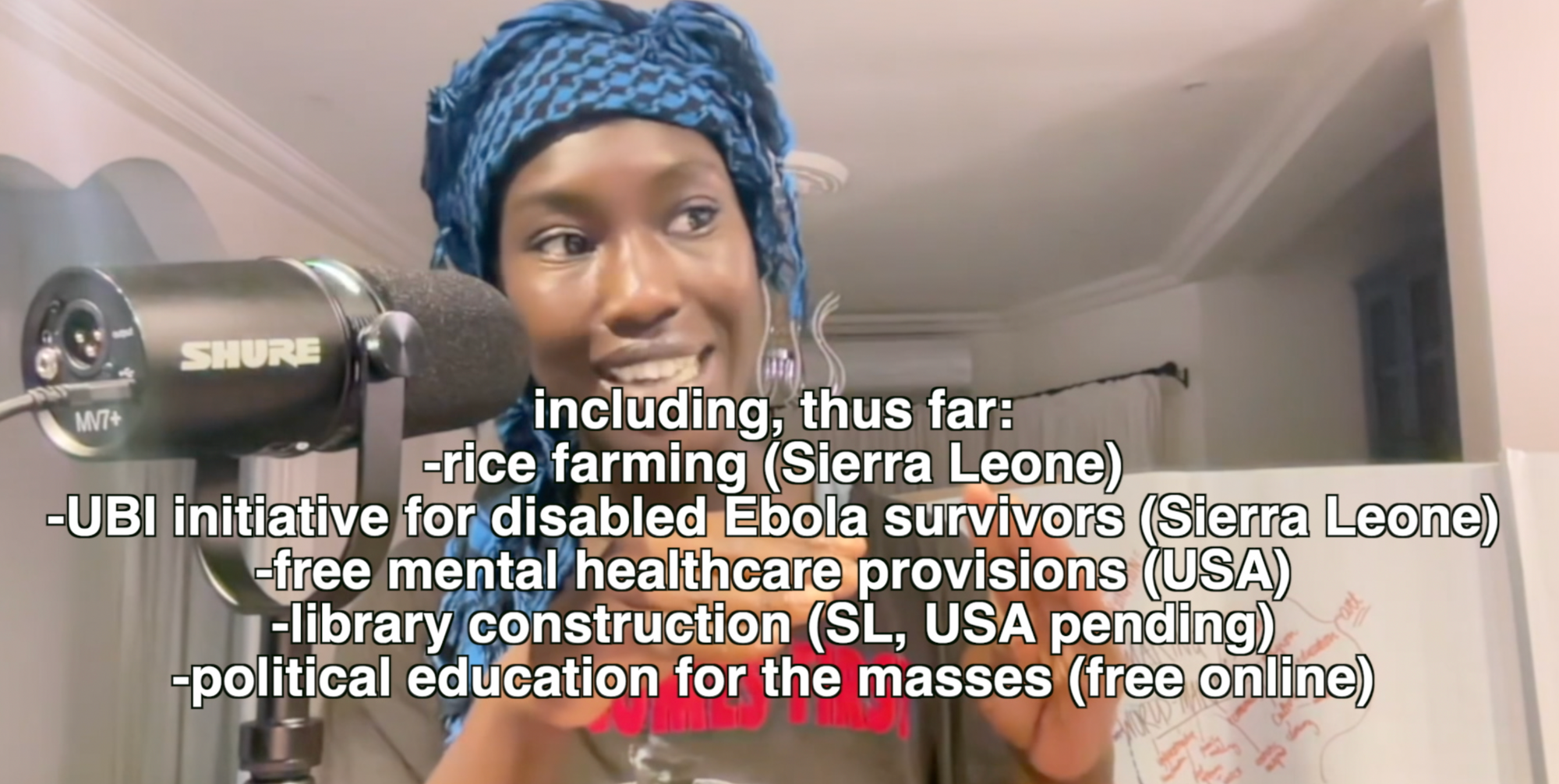
My creation of public systems shows you how I am willing to concretize power, how I am willing to materialize power, how I am willing to take the metaphysical idea that people can see me and watch me and believe in me and translate that into our physical shared world. So, the question here is:
(1) How do you stake power for the collective good?
(2) Are we (the collective) actually ready to handle something like that?
Let's get into some real world examples of these kinds of art making the defector, the capitalists, the traders and the revolutionaries.
I saw a TikTok at the beginning of April that seems to be in conversation with my own work. The thinker of the video speaks French, so I’ll be reading english translations of her work.
“We all saw this speech by Doechii when she won her Grammy, we were all happy for her. It's not her speech in itself that we will seek to analyze here, but rather how it was perceived. It has been received as a message of emancipation for Black women, except that it is not. I know that Doechii has come a long way, and that she has succeeded on her own, and all the best, she deserves it. This video does not call into question her personal success. I just have a problem with the way her speech is conveyed as a message of hope. For me, the way in which Doechii's to the Grammy is treated is symptomatic of Black Capitalism. We're trying to make pass off a personal victory, an individual victory and above all a commercial victory, as a community victory.”
The video goes on to say that Doechii is signed to a subsidiary of Universal Records, which means that she’s making way more money for white, right-wing capitalists than any sort of Black collectives. I think the analysis here does a great job of not blaming the individual who just wants to make their dreams come true and be rewarded and lauded for excellent artmaking– rather, the critic Sarah notes that whatever Doechii’s intentions, she joins the class of people that goes from oppressed to oppressor and that transition is being by media spun as a collective win for Black peoples.
The interesting bit here is when the critic calls Doechii a class defector.
Translation: And I repeat, I have nothing against black class defectors like Doechii, who access better resources or who seek the best for themselves. I'm just saying that capitalism, in any form, does not have the potential to address the injustices experienced by Black people.
I do not believe in talking about people like they’re not in the room. I also have every reason to believe this analysis is in conversation with my own essay, The Mythical Black Artist, seeing as this video cites some of the same sources and primary documents I presented in that essay and this person does follow me on TikTok. So:
Sarah! Nice to meet you. Sorry I don’t speak French yet (workin on it). You say that you don’t have any problems with class defectors while simultaneously arguing that artists should strive for something ‘a bit more revolutionary’ when creating their vision for success. These two ideas are at odds. Which is it? Is it perfectly “okay" to defect from the working class and join the capitalist class?
A defector is someone who abandons the war effort, which, I want us to remember, is not a metaphor. The life of the western celebrity requires a lot of death and slavery within the colonized world to maintain— not as a byproduct of, but as a direct result. We are in a stage of capitalism where the onus of culture has shifted outside of white world-maker’s hands, and so they pull other races and ethnicities and cultures into the ideals of whiteness to hang onto and to consolidate power. You note this as you follow the money behind this particular new artists’ successes, that she is making white men richer than she’s making any sort of Black organized conglomerates.
Do you want defectors or do you want revolutionaries? Why don’t you have anything against anyone who defects from the class war if you want artists to be more revolutionary-minded? Remember: revolution is too not a metaphor. It is not hypothetical. It works to seize power from the state for the good of the masses for generations to come— that’s a very specific thing. How are class defectors neutral? To defect automatically means you are joining the side of the capitalists, whether you mean to or not (and we can tell from some of the music, with tracks like PROFIT, that Doechii knows what she’s motivated by).
When I was first working through the linkage between all these ideas, I got on live to discuss them. We talked about the difference between a class defector and a class traitor. I pointed out that these (aptly) are all terms of war. I received a comment in response that said, do you think that war is a good metaphor?
In comes the primary title of this speech:
THE WAR IS NOT A METAPHOR.
Slavery was never outlawed, it was outsourced and hidden so that the depravity could continue without all that inconvenient moral-based pushback. Now, the slavemasters manufacture conditions of poverty and scarcity so vile and degrading people are willing to subject themselves to the conditions of slavery for dollars a day. The majority of the world makes less than $10/day. 70% of the world makes $10/day or less. Those are conditions where premature death is rampant. Conditions where people die from a lack of resources, die from overwork, or if they dare to rise up, are slaughtered by the empire in mass because their own citizens do not see the impoverished as human. We don’t see the impoverished at all.
Do we know about the banana wars? The United Fruit Company a major American corporation with financial interests in the plantation model of fruit production, utilized shareholder’s connections and cabinet positions in the United States government to invade and/or occupy (in a non-exhaustive list): Cuba, Haiti, parts of Mexico, Nicaragua, Panama, Honduras and the Dominican Republic over about thirty years. US invasion was so bad that it completely undermined land reform in Guatemala. So bad that Columbia massacred its own citizens striking against the United Fruit Company to avoid being invaded by the United States. They killed three thousand of their own citizens. The Banana Wars laid the foundation for the next era of United States warfare, a methodology called Small Wars.
If you are a worker that can get shot dead for refusal to participate in the production of capital, what are you? What economic system is that?
Do you remember when the supreme court (you know, the panel of humans that decide how human you get to be at any given point in time based on the doling out or the restriction of rights), said that child slavery was okay so long as it wasn’t happening in the United States? This was a case with Nestle, a mega-company based in the United States, brought before the supreme court because the prosecution alleged they were utilizing child slavery for cocoa production. And the Supreme Court said… well, those children are less human than our children. So it’s fine. If we are workers subject to whether the overseers’ definitions of human… what are we? Truly? What has changed between then and now?
Do you know what the United States is currently doing to Venezuela?
I had this experience in Chicago last week. I was sitting outside in the sun, just wanting to let my mind catch up to itself. I stopped and bought bread and water and just sat. There were people on the street, a man and a woman, begging for change. They did not speak English but they repeated to everyone that passed by, “Please can you help us?” “Family.” Over and over again. This was the beginning of April. It’s still so fuckin cold in Chicago at the beginning of April. I had given them money before I sat down but then I was just sitting there, watching people walk past them. Most people do not look. I know this is commonplace. I know this is how we are trained to treat depravity— our eyes are so focused on the acquisition of blood dollars that we look away from the actual blood. We do not think about it. It’s just that... do you know what the United States is doing to Venezuela? Do you know why these people are here learning their first words of English in order to beg? This don’t remind you of Palestinians who do not speak English learning to say “if you skip me, you’ll kill me” so that they can escape bombardment? Maybe it’s because I too am just a digital panhandler at the end of the day, having decided almost two years ago to work for free… but… y’all don’t see yourself in them? Not even enough to say hello when they speak to you?
If you work for a living (as you cannot afford to retire today), you are in the working class. We are in the global working class and I do not we think we understand that on a fundamental level. We do not have a relationship with work where can we choose to participate. They slaughtered people over cheap fruit. Not even for access to the fruit itself– for access to the fruit so cheap that we lock the ones that don’t sell in dumpsters to be forcibly thrown away. If we in the core of the empire strike such that we throw wrenches in the war machines, I just saw a TikTok today that said something to the effect of the organizers are disappointing us. How can you get a hundred thousand people to show up for a march on Washington on a Saturday when no one's there, but no one is stopping the war shipments? It's because no one is prepared to die.
If we in the core of the empire strike such that we throw wrenches in the war machines, we will get shot where we stand. The war is not metaphorical. The global working class is in a compulsory relationship with labor. We do not get to choose whether we work or not. And this is forced labor at a time where human production and capacity for prosperity has literally never been higher! There are a great many ways to die, but the result is the same. Participate in the hoarding of capital or become the blood that soaks the money, which feels like a moot point to me when my people, me, my blood, my family— not just generations ago, today!— are the blood that soaks the money. Today. The war is not metaphorical. The global working class is in a compulsory relationship with labor— forced labor— at a time where human production and capacity for prosperity has never been higher. There are many ways to die, but the result is the same: participate in the hoarding of capital or become the blood that soaks the money.
Returning to the bit about gaze:
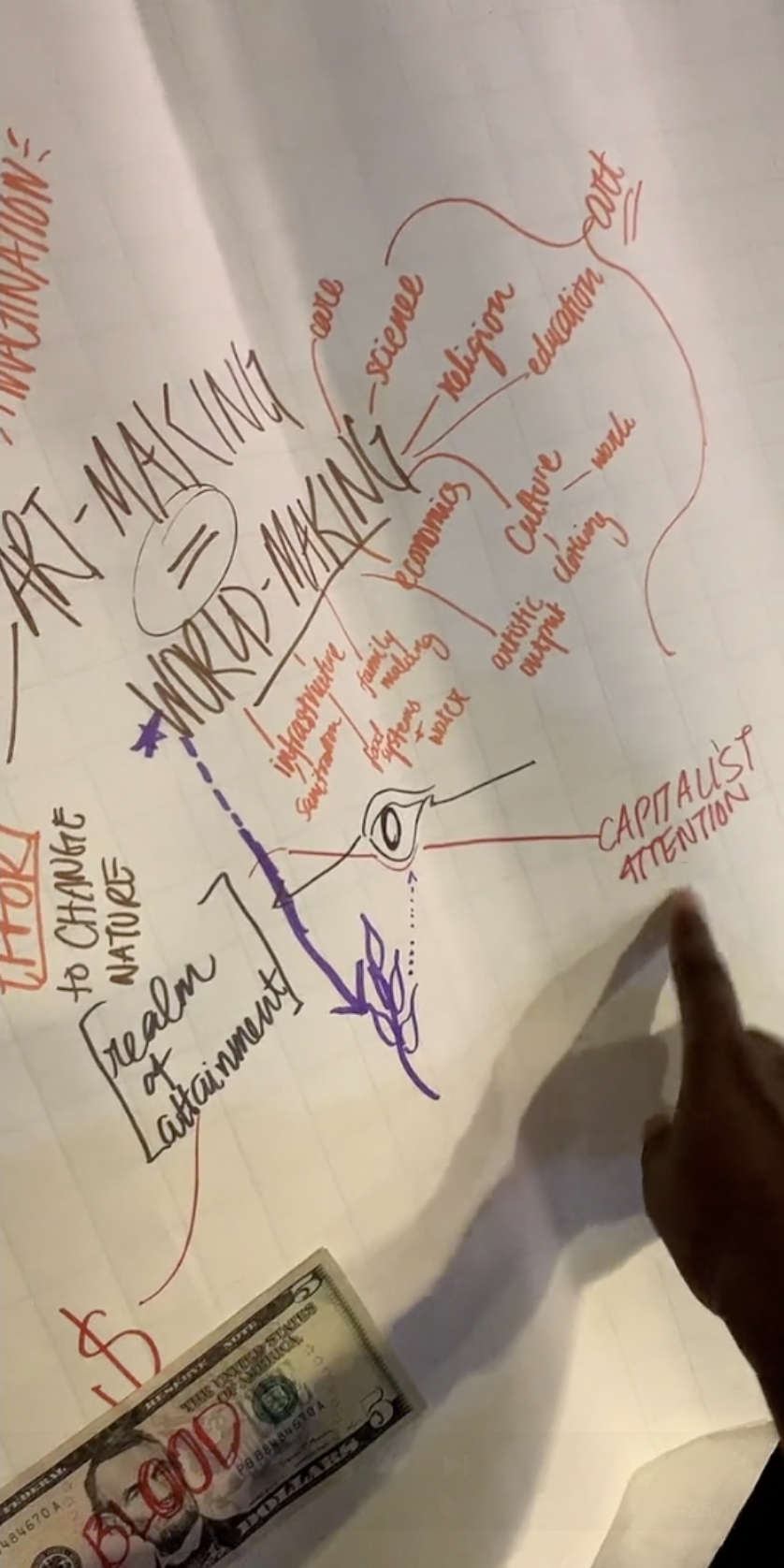
That capitalist attention does not, will not, cannot, refuses to compete with any kind of attention that is world making, okay? Revolutionary art, art which seeks to divest from the systems that we have in place, art which seeks to grow things, which makes life, is in direct conflict with capitalist attention that teaches us that freedom and success is in US dollar blood money. This is why we see artists that we lifted up, artists that are institutionally rewarded, are the ones that talk about how badly they want money or how dollars are success or how dollars are freedom, dollars are paper.
Dollars are paper. This is paper.
The war machine only runs because we run it. And we run it because we were taught to believe that these silly bits of paper make us free. And that this is the only kind of freedom that's possible. And as for the blood money bit, the spoils, the comforts that make for a dignified, streamlined life, it costs other people in the world their lives. A life spent in slavery ensuring that the exploitation of once sovereign land, guaranteeing the endless production of capital, spent witnessing your loved ones be ground down by the empire until death catches you too. The spoils cost blood.
Quickly, on Deservingness:
In that TikTok referenced that reframes Doechii’s grammy’s wins not as some collective good for our collective mass, but instead as another working class person who managed to ascend to the position of powerful artist, Sarah says something else I disagree with– that Doechii put in her time and deserves the success.
This, for one, is an argument that is unilateral. Dochi's not even cc'd on this email. This is something that I believe wholeheartedly for every person watching this, for every person speaking this, and for every person who is or ever could be an artist: there is no amount of study or of talent or of power that would allow you to deserve the blood money. I will never believe that. Success in this iteration of world making means blood money and there's no getting around that. All of the luxuries and conveniences and comforts of fame are ensured and backed by slavery. The paper money isn’t the thing of value– the blood that anoints the paper is. There is no way that you can deserve spoils which force the bottom half of the world to live like they do. There is no amount of talent, work, excellence, dedication… I do not care. There is no amount of good work you could put out that could ever justify the level of depravation the bottom half are living in. It is an exponential, an unspeakable amount of suffering that the colonized world– that MOST OF THE WORLD– endures to provide the ability for a handful of people to access endless comfort and produce endless waste without consequence or delay. We don't even let the dogs in the empire live like that. There is no amount of beauty or diligence or hard work or talent that would make anyone Deserving of the other side of that coin. Scarcity is manufactured and the suffering is needless. Absolutely no one deserves to live and die for the sake of money made fertile by blood.
So with that being said, again, I don’t like to talk about people like they’re not in the room:
Doechii, girl: do you know that you’re a class defector? Defectors are typically aware that they are at war, but we do not speak of the globalized class war in the United States. We are trained not to think of the outside world, the colonized world, at all. We don’t even have geography as a part of public school curriculum, that’s how bad they do not want us to look outside of the lane of profit. I rarely mention artists by name because it makes them the point, rather than looking at the systems as a whole, but I cited this particular work that was about you– and I don’t like to talk about people like they not in the room. Doechii: have you ever wondered about what it might be like to stake your power for greater revolutionary desires rather than making the rich people around you richer? Have you grappled at all with this decision on the ascent? I know being addressed like this might be uncomfortable but I ask directly because… I am willing to bet that no one around you is particularly incentivized to ask you these questions, you know? No one tells the young, pretty money machine to wonder about why there are so many “immigrants” from Venezuela (refugees. They are refugees from the class war). I ask because I now have a number of homies experiencing heightened levels of power and visibility who tell me that I am the first person to ever ask them questions like this. I also ask because I myself am experiencing heightened levels of power and visibility, and I was fortunate enough to have been radicalized significantly before I got up here on the world’s stage. I didn’t know how rare that is. I didn’t know how rare it is to get trained out of the gaze that fixates on success as US Dollar Bills, especially before ending up on the world’s stage. I ask because now, I have skin in the game as someone who is no longer a regular degular, rank and file member of the working class. I am a celebrity and a royal with enough power and authority to partner with international NGOs to create Sierra Leone’s first disability assistance program. Nothing about our reality: traitorship, defecting, searching for sovereignty, the blood on the money– none of this is metaphorical. The search for sovereignty will either lead you to making privatized systems, thus, becoming a capitalist, or you will create systems accessible to the public, making you a revolutionary.
Then, to the rest of us in my living room here with me: when we think of revolution, we think of militants with guns. We do not think of newspapers and budget meetings and town halls and food prep and hospital transit and admin all the in-between technologies of building out new infrastructure. Revolution is the start of something, not just an ending to old systems. It’s a marriage. It’s a baby being born. It’s fragile and needs to be protected. And: revolution seizes power from the state. Oftentimes, we imagine the seizure of state power by force; that’s true, and necessary, and not exclusive. Power, in any reality, comes from how many people believe in your reality enough to participate in it. Remember that reality is just what we collectively witness. If you build educational systems or food systems or healthcare or architecture or infrastructural support that makes masses of folks invest more in your system than they invest in the state, you have successfully made yourself an enemy of the state.
Are we prepared, we the masses, are we prepared to support powerful people who decide to be revolutionary instead of being capitalist? Because those people get targets on their back. Those people, if not successfully coopted and bought out, risk exile, jail, or being hunted and shot. One of the reasons the revolution within the United States failed was because the public was not with the revolutionaries. And we had the systems: we had new republics across the colonized world. The Black Panther Party had embassies in different countries working on revolutionary governments. The 1960s and 70s had Black radical, Black revolutionary diplomats, culture leaders, writers, musicians, political leaders inside and outside the federal and state electoral system, political parties establishing public programs and a militia. What they did not have was the mobilized support of the masses beyond passive spectacle. The masses, then and now, were okay to march, to wear a t-shirt, to speak about their support. They were and are not willing to abruptly cease participation in the nation-state apparatus.
Representation then was not aesthetic only. Representation literally re-imagined what Black people are capable of doing… now. Not in some hundred years, not our children’s children’s children– now. For a moment in history, when you were looking at highly visible Black people, you had the infinite loop of opportunity. The if this, then that, right? To be young, gifted and Black. The human brain is so adept at making logical connections. We are thought creatures, you know? To be human is to search for something. We human beings constantly search for what is possible, because what occurs to us can be done. What is possible to think becomes possible to do. We can literally do anything we imagine. So then, as artists… don’t we owe it to ourselves to challenge what we are and are not allowed to imagine?
Subsection III: YOU ARE LOYAL TO WHO FEEDS YOU
And I mean this. I have witnessed too many artists with radical bearings, with radical teeth on them, dull their bite to fit better into the ruling class. Budding revolutionaries sell a book well, excel on the press circuit, and then have a new orientation overnight. They’ll talk about revolution in theory, as if it is not occurring right now. Resistance is occurring right now– the war is not a metaphor. But then, you are loyal to who feeds you. Don’t you know? You are loyal to whoever is keeping you stable, in check and well-fed. So leftists YouTubers that make it into a decent payday are loyal to the algorithm, and radical rappers that make it into the mainstream are loyal to sales and streams, to their labels, and authors with a bite behind their pen write to become loyal to residuals. I don’t ever want to be bought by the gilded idea of stability.
The reason I made this book is to build literacy. This book builds a library. Reading is one of the most radical technologies available to the global working class, and my Black masses are barred from reading systematically. First thing I’m buying for this library I spent all my money on are solar panels. Next thing I’m buyin’ are trucks so I can get books upline, to my constituency. To where my granddad is buried in his chieftancy plot. So this book is for the people, and so is the next one and the next one and the next. You can read me, essay after essay, radicalize by writing for you all. And I personally don’t get a dollar that you all do not give me to say here, eat, be well. Hell, I use that money on the rice harvest anyways. The point of this short and sweet section is to say that you are loyal to who feeds you, and there is a reason I choose to be donation funded. I know I don’t have to be. I choose to live off entirely voluntary donations because it asserts, every day that I am alive and have bread, that I am loyal to the people, and that the people have chosen me to do this work. I am so grateful. I prayed for this life. Thank you God.
IV. HOW DO YOU STAKE POWER?
You build systems. We are taught that the correct thing to do with power is to stake it and build a system that can support you for the long term on top of it. Within my lifetime, we’ve really only seen powerful world-makers build robust private systems for their own personal/familial use. Some argue a Nipsey Hussle did work to create resources in his community... and I do like his world-making. I do. I recognize that what I am about to say next is possible because he presented me his version of a new reality and I was able to ask, “What else is possible?” Here I am, audacious: I would argue that his methodology of giving back to his community was the charity model, wherein you give only what you can reasonably afford to lose. Staking power requires risk, skin in the game, and precarity. Black capitalists understand this in the stock market and return on investments, but somehow lose their teeth when we're talking about building power for our Black masses. You yourself, when you got skin in the game, are leaning on and depending on the systems that you help create.
Any entrepreneur knows that point in the establishing of a business where everything you have are tied up within the success or failure of your enterprise. You staked every power you have on the building out of this system. People do that for privatized, scalable systems. We do not see representatives, defectors or traitors build public systems for public use very often because the empire hunts and shoots them.
I, ismatu, continue to explore a new kind of blueprint— or, rather, a remix. It’s not new; I'm not reinventing the wheel here. I'm just doing something that I haven't seen in a long time. I stake power for the purposes of collective sovereignty. A traitor or defector never stays there for long. These are transitionary titles. You move from one thing towards something else. You cannot stand still in these systems that you have. You either move or you will be moved. So these transitory titles, right? In our search for sovereignty, the ability to provide for ourselves and our families, the desire to expand our skills and to pull down new realities, we either become capitalists or we become revolutionaries.
So how do we transition from the desire for endless consumption to kinder and more sovereign means of production, wherein I go down the street to the fruit lady and buy these, and I have to wait two more days for it to ripen properly so that I can eat it well.
[59:01.7]
The whole world could live like this.
Written Conclusions (from representing hope).
A note: the written conclusions and that from the video differ, just in case you’re curious.
Someone called Lauren emailed me today, asking how the making of the library is going. Well, thank you! I appreciate your asking because I don’t often stop to assess how far I’ve gone from the standpoint of a stranger. To you all, everything looks amazing, I guess. For me, I feel every frustrating step of the way, when objectives are realized out of my preferred order, when I neglect my work, the sleeplessness, the weights on my head (etc). I want instant-noodle level pubilc services and things don’t happen like that. Systems take time to build and erect. Most of May has been spent (1) making sure the rice harvest is good (we seeded thirty acres) and (2) trying to get water to run again in this big giant house that no one has lived in for a while.
On my microlevel, I am always just waiting for the next step of the next project. On the macrolevel… did I just say that? Thirty acres of rice fields seeded? A triple level multi-purpose library… with RUNNING WATER in SIERRA LEONE? What?
I forget that one time ago I thought these things were impossible.
When I asked you all what I represent to you, by far the most recurrant answer was hope. That I, ismatu, pen behind the essay and dawner of my fuzzy I-am-deeply-overwhelmed pink footie pajamas, represent hope.
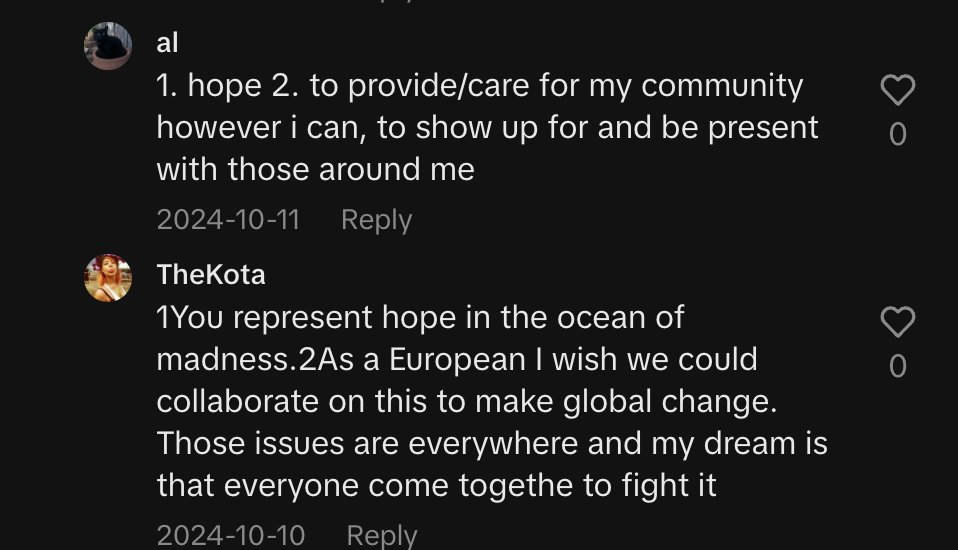


There are more of these comments featured in the video, but these are few.
To represent hope… someone even said that I make the future real. That watching me work helps cement that the future we have coming is possible and can belong to us. I love that. I want this to be a contagious feeling.
If that’s what I can do with a little bit of power… what can I do with a lot?
Ah. Considerations for tomorrow. For today, I am finishing my tea and going to bed.
Warmest and kindest regards. I hope the work of your day passes through your hands with ease.
ig
(here’s the fundraiser link for the library, in case you needed it again)
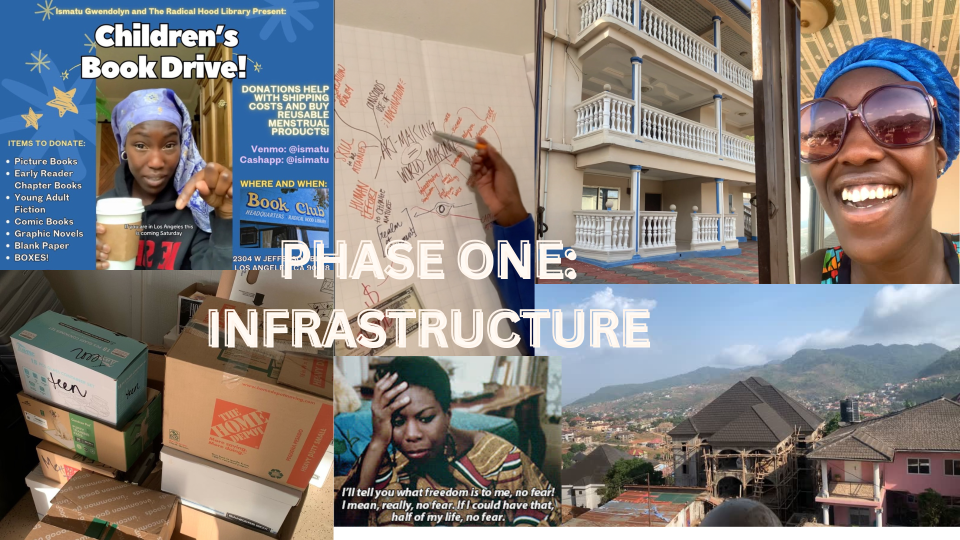


Member discussion